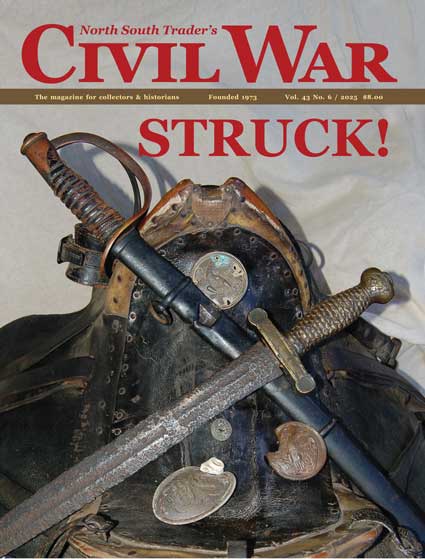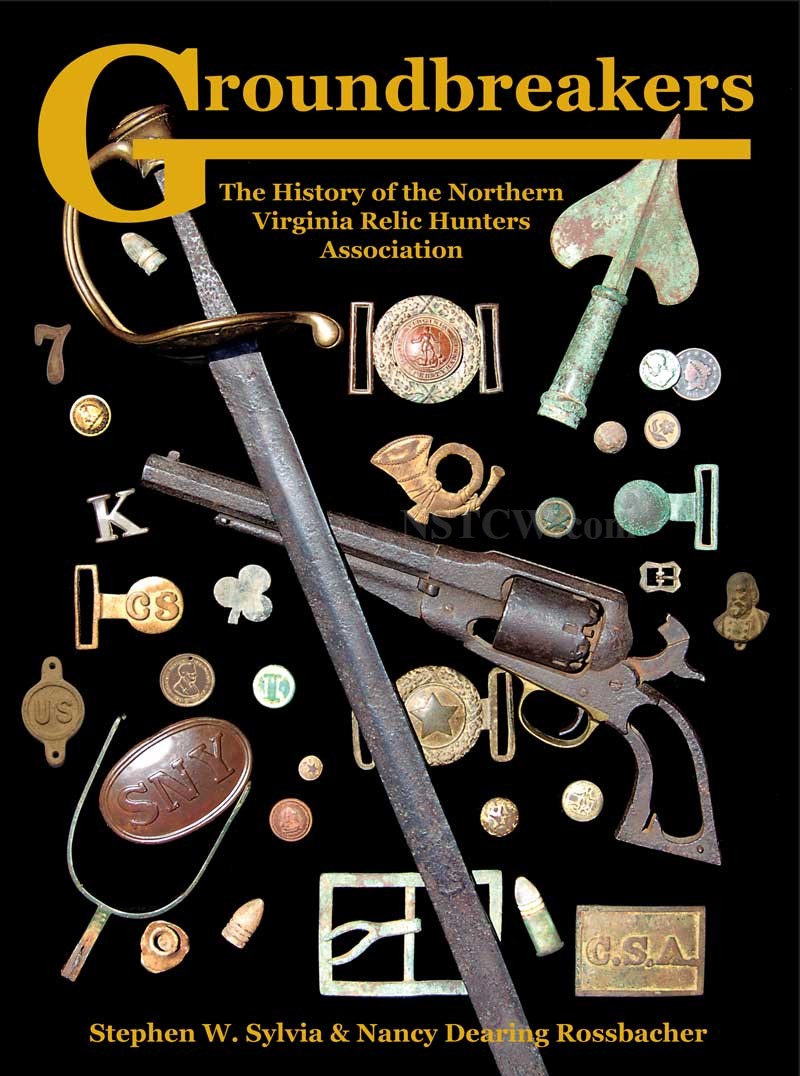|
Publisher's Forum Issue: 36-2 |
|
Vol. 36 No. 2: Learning the lingo When I was a kid I loved to visit Civil War battlefields. While everyone else was reading the signs, gazing at statues and monuments, and posing for photos in front of cannon, I was scrambling through the bushes looking for guns and swords dropped by the soldiers. I desperately wanted to find a drummer boy's hat that would fit my head. At Gettysburg I crawled between huge boulders knowing my efforts would pay off sooner or later; they didn't unless you call poison ivy and scraped knees a payoff. I remember in grade school I saw an article in a magazine about a man who found relics with an army mine detector. I knew that was for me. He didn't have anything but a bunch of cannonballs and some broken gun barrels. No swords, belt buckles, bugles, buttons, and definitely no drummer boys' hats. I knew I could do better. Years later, after searching high and low for a mine detector, I found a shop in Wheaton, Maryland, that was filled with Civil War "surplus," as it was often called back then. Behind the counter was a brand-new metal detector in the box. Bill Printz, the owner of the Potomac Trading Post, offered me a little advice about the detector, and I became the proud owner of a Metrotech. I realized that only a few people in the world looked for relics with a metal detector, so I wasn't surprised when I spent a couple of years hunting battlefields without encountering another relic hunter. I didn't even tell my pals about it, probably because anyone who wasn't into working on old cars or playing sports was considered a geek. Tramping around the woods digging up Civil War relics would have surely outed me as a weirdo. One day after hunting in Chancellorsville, I came upon a relic shop along the old gravel Plank Road. I met the owner, a grizzled Virginian named Harry Pulliam, and looked around the shop with wide-eyed wonder. Excavated swords, bayonets, rifles, pistols, shells, belt buckles, buttons, and bucketfuls of bullets filled the showcases and hung from the walls. There were several other people there too, and I could tell the were relic hunters by the dirt on their faces, hands, and knees. Unlike me, though, they sported crew cuts and were wearing clunky work boots, faded jeans, Levi jackets, and ball caps. I had a ponytail and was attired in bell bottoms, a faded tie-dye shirt beneath a WW II Eisenhower jacket, and well-worn Beatle boots. They gave me the once-over and promptly ignored me. I'm sure they thought I was a stoned, hippie tourist. I was certainly not a tourist. The owner looked at me and said, "Show us your treasure." I was once held up by a trio of punks who demanded, "Let me see your nickel," so for a moment I feared I was supposed to empty my pockets and surrender my wallet, watch, and ring in a prelude to "Deliverance." Then I realized Harry was referring to my day's relic finds. I went out to my little orange Datsun, parked between two crusty pickup trucks, and got my musette bag. I'd hunted all day and had quite a bit of treasure. Pouring out the contents on the counter inside, I watched as they examined my hoard. "Man, look at all them pack parts and gardeners!" remarked one. "Yeah, looks like one of them's late though." Another asked, "Does that cootermint plate have puppy paws?" One of the other guys said, "That martingale's right pretty, ain't it?" "All the buttons are locals," said one. "Even the one with the push in it?" asked another. "Sure is a pretty patina on that cape pin." I was dumbfounded. I had no idea what they were talking about. What were gardeners, puppy paws, locals, cape pin, and pack parts, and just what the devil was a "cootermint?" And how could one of my bullets be "late," whatever that meant? Harry smiled and said, "You did good today, son. What kinda machine you got?" I started to say Datsun B210 hatchback when I realized he was referring to my detector. "Metrotech," I replied. "Redhead?" he asked, and I was stumped. I knew then I was in over my head and couldn't fake it. I think I mumbled, "Huh?" Harry sensed my unease and veered away from the question. After the others drove off, I asked Harry about some of the expressions they'd used. He chuckled and began to educate me about the hobby's slang. There was an entire language to be mastered if I wished to converse with experienced diggers and collectors and not sound like an utter newbie. I did eventually master the patois and could sling around comments like, "We were digging pits on hostile land, and I dug two Yankee box plates, a couple of J-hooks and triangles, and an HT&B droop-wing CS staff with shank. My buddy Mike probed a hut site and turned up two inks, a medicine, a sling hook, and a pile of Type II cleaners." I discovered over time that some of the diggerspeak was composed of misunderstandings, misnomers, and made-up nonsense. One of the worst offenders was the term "local." The notion that buttons were made "locally" as an explanation for the lack of a maker's mark on the reverse was pure fancy. The term is still in use by many even though it is based on an assumption that has long since been proven incorrect. Another that still pervades relicspeak is "martingale" to describe the heart-shaped plates that decorated the breast strap on a horse's tack. Martingale is actually the leather tack that controls head carriage, and the plate is merely a breast strap plate. "Cape pin" is still in vogue, although I am convinced they were used as watch fobs. Maybe a few officers wore capes, but enlistedmen sure didn't. There are far too many excavated examples to attribute them to officer use only. Other terms, such as "sabot" and "accoutrement" (which I first heard as "cootermint"), are mispronounced French words. But if you say sah-BOW or ah-coo-truh-MAW, you're likely to get some funny looks. But while these days I wince at some of the more off-the-mark designations, back in the day I was anxious to fit in and attain fluency in southern relicspeak. On my first visit to Harry's shop, he generously invited me to go detecting on weekdays with him whenever I wished to drive down from Maryland. I could hardly wait to learn more digging lingo from the old pro. The following week I left home at dawn and drove down Route 1 toward Fredericksburg. I was anticipating finding some great relics and adding a few more words to my expanding digger's vocabulary. On the way I stopped at an old-fashioned diner to have breakfast. The waitress asked what I wanted, and I said I'd like her best southern breakfast. She tucked her stubby pencil behind her ear and hollered over her shoulder, "Flop two over easy, slab of moo, let ‘em chew it, and heart attack on a rack." She cracked her gum, barely glanced at my astonished expression, and asked, "You want looseners or whistleberries with that?" Oh, no, I thought, here we go again. —Pub. (Steve Sylvia)
The publisher welcomes comments from readers. He can be e-mailed at
publisher@nstcivilwar.com. |
| Past Publisher's Forums click an issue number to view |
| 43-6 |
| 43-5 |
| 43-4 |
| 43-3 |
| 43-2 |
| 42-3 |
| 42-3 |
| 42-3 |
| 42-3 |
| 42-3 |
| 41-6 |
| 41-5 |
| 41-1 |
| 40-5 |
| 40-4 |
| 40-3 |
| 40-1 |
| 39-6 |
| 39-5 |
| 39-4 |
| 39-3 |
| 39-2 |
| 39-1 |
| 38-3 |
| 38-2 |
| 38-1 |
| 37-6 |
| 37-5 |
| 37-4 |
| 37-3 |
| 37-2 |
| 37-1 |
| 36-9 |
| 36-6 |
| 36-5 |
| 36-4 |
| 36-3 |
| 36-1 |
| 35-6 |
| 35-5 |
| 35-4 |
| 35-3 |
| 35-2 |
| 35-1 |

